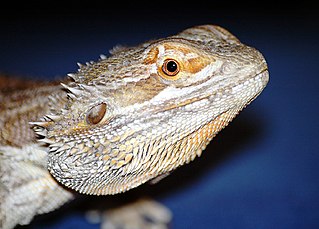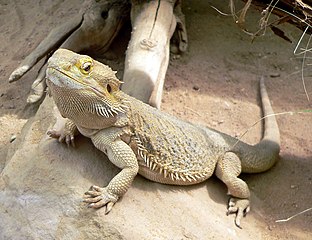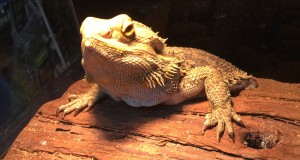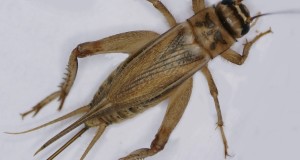Leopard Geckos and Bearded Dragons have stellar reputations among lizard enthusiasts. In fact, they come as close to being perfect pets as any reptile can. However, there are major differences in their habits, activity levels and care needs, and it’s important to be aware of these when choosing a pet. When an animal is active, how much its care will cost, the space it needs and other factors will affect your pet-keeping experience and your new lizard’s quality of life. In the following article I’ll compare Leopard Geckos and Bearded Dragons in all relevant areas. Detailed care information is provided in the articles linked under “Further Reading”; as always, please also post any questions or observations you may have.
Reptile Handling
Most lizards are best considered as “hands-off” pets, but both Leopard Geckos and Bearded Dragons break this rule. Although individual personalities vary, both adapt well to gentle handling, and are not stressed by human contact.
Activity Levels
Neither is overly active, but both have fascinating behaviors that are well-worth watching for. Bearded Dragons are out and about by day, at which time they bask (their most common “activity”!), feed, and display to tank-mates.
Leopard Geckos, being nocturnal, are ideal for owners who are “night owls”. They will become active in a dimly lit room, or you can equip the terrarium with a black or red reptile night bulb (lizards do not sense the light produced by these bulbs). Leopard Geckos sometimes emerge during the day as well, especially if food is offered.
Life Span
A Leopard Gecko in the St. Louis Zoo’s collection lived for a record 28.6 years. The published longevity for a Bearded Dragon is 15 years, but there are unofficial reports of individuals approaching age 20.
Lizard Reproduction
Both species breed reliably, and a wide variety of color morphs are available. Please see the articles linked below for detailed information.
Cost
Bearded Dragons require larger terrariums and higher temperatures than do Leopard Geckos, and must be provided with a source of UVB radiation (Leopard Geckos and other nocturnal lizards get along fine without UVB bulbs). Therefore, Leopard Geckos are the less-expensive pet, in terms of supplies and electricity use.
Terrarium Size (single adult)
Leopard Gecko: 10-20 gallon (larger is preferable)
Bearded Dragon: 30 gallon
Temperature
Leopard Gecko: 72-85 F, with a basking site of 88 F
Bearded Dragon: 75-88 F, with a basking site of 95-110 F
Lizard Diet
Leopard Geckos are carnivorous. Young Bearded Dragons feed largely upon insects, adding plants to the diet as they mature.
Both require highly varied diets comprised of vitamin/mineral supplemented roaches, silkworms, crickets and other invertebrates. Bearded Dragons also need various greens and, perhaps, a high quality commercial food. Mealworms and crickets alone, even if sprinkled with supplements, are not an adequate diet for either lizard. Please see the articles linked below for more information on diet.
Health Concerns (Pet and Pet Owner)
Intestinal impactions that result from the ingestion of sand and gravel are perhaps the most commonly-encountered health concern (both species). This can be avoided by the use of cage liners, or by feeding your lizards in large bowls, via tongs, or in a separate, bare-bottomed enclosure. Young lizards, being clumsy hunters, are more likely to swallow substrate than are adults.
Diseases related to poor nutrition are common among lizards maintained on crickets and mealworms alone, and in Bearded Dragons that do not receive adequate UVB exposure (Vitamin D3 is manufactured in the skin, in the presence of UVB). Both species sometimes refuse food in the winter, even if kept warm (please see this article for further information).
If a moist shelter is not available, Leopard Geckos sometimes retain the eyelid lining after shedding. Please see this article.
Atadenovirus infections are becoming increasingly common among Bearded Dragons. Unfortunately, the resulting “Wasting Disease” or “Star Gazing” is incurable. Please see this article for further information.
Salmonella bacteria, commonly present in reptile and amphibian digestive tracts, can cause severe illnesses in people. Handling an animal will not cause an infection, as the bacteria must be ingested. Salmonella infections are easy to avoid via the use of proper hygiene. Please speak with your family doctor concerning details, and feel free to post below if you would like links to useful resources.
Further Reading
Complete Guide to Bearded Dragon Care
Complete Guide to Leopard Gecko Care
 That Reptile Blog – Reptile, Amphibian and Exotic Pet Care and Information
That Reptile Blog – Reptile, Amphibian and Exotic Pet Care and Information






Hello.
I am a little (or more) shocked at your recommending a 30 gallon for a bearded dragon at full size. Most 30 gallons that I have seen are 30inches long. Much to small for a full sized dragon. I am baby sitting one for a friend and she’s in a 40 breeder and I would think this is a touch to small, but the smallest I would ever recommend for an adult except in very short term use. When I had her in a 20long for the two days I had her before I could get a larger cage it was much to cramped. everything else looks great about your information you provided IMHO.
Hello Amber,
Thanks for your interest and sorry to shock you..but this is among the lesser shocks I’ve accomplished I’m sure! Seriously, the text should read “30 long”…these are 36 inches, and often stores sell 33 gallon longs instead, which are 48”. The space is suitable, although more is always better, but even in the larger sizes the main problem is establishing a thermal gradient…possible, but takes experimenting with bulbs, etc. But,. realistically, these are the sizes that will be used by most, and bearded dragons do adapt well. I’ll make the change in the near future, thanks for the heads-up, best, Frank
Hi Frank!
Great blog with a lot of helpful advice.
I’m amazed to learn that a gecko can live for over 20 years.
I live in Thailand and we have house geckos everywhere.
Bearded dragons seem like a lot of fun too.
Hello,
Thanks for the kind words.. We have several SE Asian geckos established here in the USA..escapees from the pet trade that are now breeding in Florida. House geckos tend to love for only a few years; leopard geckos and some others reach age 20 or so in captivity. best regards, Frank
I am interested in purchasing a bearded dragon for our 10 year old son, who absolutely is fascinated by reptiles of all sorts and sizes. I’m curious though which of the two species you wrote about in this very informative piece, is “hardier” so to say?
We live in a home that is kept at 68 degrees most days, and very low moisture(too much humidity interferes with my asthma) levels.
After reading your article, I believe that the bearded dragon may be a better fit for my 10 year old, our home and lifestyle, what do you think?
Hello Melissa,
Thanks for the kind words. Both need arid conditions, so fine there. Leopard geckos nocturnal, and less “interactive” than BD…dragons will signal people with arms (dominance display), eat from hand, out by day, move around more, etc. They also eat more often, which kids enjoy. More amenable to handling also.They do need larger tanks (30 gallon long style , at least, for an adult), very high basking temperatures, and exposure to UVB light. If you can provide such, I’d go with the BD. Please see this article for care info, and let me know if you need anything, best, Frank
Hi,
Can someone tell me which lizard could fit better to my lifestyle?I am 11.5 years old and I live in city in medium size apartment.I have large space in my bedroom,so space isn’t the problem.I want a lizard that is calm,wont bite,enjoy to be handled and maybe cuddled.In my apartment there is usualy 64-60 degrees.I can gut feed insects and can provide other food that is possible.I am first time reptile owner,so I don’t want a needy lizard,like iguana,neither expensive one.I live with my mom,brother,one budgie,one hamster and one dog.In our building,you can have maximum 7 pets,so we won’t be kicked out.Now,I have some questions:
1.How do I adjust the temperature in terarrium and keep it same?
2.When adjusting temperature,does the room temperature count?
3.Which heat products are best?
4.Can crickets eat your lizard?
5.Do lizards pee?
Thank you!
Hello Lily,
A leopard gecko would be a good choice. They can be handled, but not cuddled etc..reptiles are best thought of as creatures to be observed and handled a bit, but none enjoys prolonged holding etc. Also, it’s important to use proper hygiene in order to avoid Salmonella; most reptiles have this in their digestive tracts; it does them no harm if they are healthy, but can cause illness in people. Please see this article...best to show your mother as well.
Room temperature will affect the strength of the heating elements you’ll need. You will need a below-tank heat pad and an incandescent bulb (60-75 watts should be about right). Please see this article for links to these items, and for information on diet, temperature etc. and let me know if you have any questions.
Lizards produce release urine along with their droppings. Leopard geckos are native to desert-like regions, and are very good at conserving water. Not much liquid is released…instead of urine, chalky-white deposits, or urates, are released. Best, Frank
I’ve been wanting one of these two lizards for a long time but I have never settled on ether….. (I am 12.5 and I’ve wanted a lizard since I was 7) I live in northern Indiana so it gets kinda chilly. (59 f more or less) I live in a pretty small room so size might be an issue. But I need one that can easily bond with most people because I have 3 little sisters. Cost is our biggest problem, my dad doesn’t think a lizard needs all this stuff so he’s not willing to spend much. (I can understand that it does need that stuff!) Which lizard is best for me?
Please reply soon,
Logan
Hello Logan,
Well, with 4 children your dad certainly has many bills to worry about!! I’d start with a leopard gecko…you can use a smaller tank (i.e. 10 gallon) and they do not need UVB bulbs; night and daytime heat is necessary …a ceramic heater or under-tank heat pad can be used at night, so that you will not be disturbed by light as you are sleeping. They are also calmer than bearded dragons, easier to handle and adjust well to others. Please see this article, which compares the expenses involved in caring for each, and let me know if you have any questions. Good luck and please keep me posted, Frank
Thank you so much!
My pleasure, Logan…let me know if you need anything, best, Frank
Do you have any ideas on a good substrate?
Hello,
Cage liners are the safest option; please see here for some other ideas. best, Frank
Hello Frank! I found you on a forum once and so enjoyed your work!! Ok so here is my question! I am a 51 yo woman who has never had a reptile. I like to think of myself as a better than average pet owner of various species I have now of birds ( including poultry and parrots) and mammals including goats and cats and dogs and horses. I have thought about gettingv reptile for a very long time as I am not an impulse buyer of anything but especially of a living thing. Whoever I get I will commit to. I worry about this wasting virus. I am so concerned in fact, the research I did about beardies well, I have let that IDE stagnate for 8 months now. I just want to make sure I do not get sick guy or gal. I do not know who to purchase from and I am not sure if a gecko would be a better choice. I do want a reptile that enjoys human company as some reptiles are stunning but I would feel intrusive! Any and all advice is welcomed? Ok who would be a truly hands on pet? I am going to read your wStingbadticle right now! Sorry I got long winded! You are aces many thanks!!
Hi Teresa,
Sorry for the delay, your post slipped by me. Thanks very much for the kind words.
The disease is gen not possible to detect w/o lab work etc…millions of bearded dragons are sold w/o incident, but there will always be the risk, at least for foreseeable future. Leopard geckos take far less work and expense to set up and keep, are not stressed by handling; nocturnal but will emerge to feed by day, available in a huge array of color morphs as well as wild type, etc. Please let me know if you need more info or other ideas. best, Frank
Dear Frank,
I have a leopard gecko now and I want a bearded dragon. I have had a problem with feeding my gecko. Took him to the vet, force fed him, put the food right in front of him etc. Do bearded dragons eat more easily? are they less prone to illness?
Thanks so much,
Ari
Hello Ari,
All lizards are susceptible to a variety of problems,. but the 2 mentioned are among the hardiest. The gecko should not be force-fed w/o isolating the cause of non-feeding – winter slowdown, improper environment, intestinal blockage, disease, etc. Please send some info re it’s terrarium and care and I’ll review if that might be helpful. Please also see this article on bearded dragon care . Best, Frank
I have a 20 gallon cage. I have a lamp. I also have a heating pad but its usually about 75 to 80 degrees tops. I have a warm side with a rock and a cooler side with another hideout. I have a branch that is always wet for humidity in the back of the cage. I don’t know what to do with my gecko because I will feel bad to let it go but I don’t want it anymore. I used to have a gecko when I was younger and she also didn’t eat. Do bearded dragons eat from bowls with worms or do you have to put the worms in front of the dragon.
Hello Ari,
That set-up would not be appropriate for a bearded dragon…please see the care article I forwarded last time for details.
If you wish to re-home the gecko, your best option would be to contact a local reptile club or herpetological society and look into members who may adopt animals. Please let me know if you need help in locating such an organization. best, Frank
Dear frank,
thank you for answering so quickly. I know this would not be appropriate for a bearded dragon. I was wondering if it was okay for my gecko. My main question is if bearded dragons eat superworms worms out of a bowl because crickets are a hassel And roaches are expensive
Thanks again
Hello Ari,
S mealworms form only a small part of the diet,,,,crickets and other insects, and a variety of vegetables, are also essential. Best, Frank
I would like to give the lizard to an organization although I don’t have an idea which one.
Thanks for your time and patience.
Ari
Dear Frank,
What organization would take a gecko that doesn’t eat anymore? I don’t think a pet store would take him back and I haven’t found any organizations.
thanks,
Ari
Hello,
You can search under “herpetological societies” and “nature centers” along with your location. You might also call the nearest zoo and ask for any nearby herp groups or nature centers. best, Frank
I can’t find anything. all the places are for adoption not to donate
Sorry, Ari, I do not have any other options for you. Perhaps reaching out on social media for people interested in adopting reptiles? Maybe there are some related groups on FaceBook?
Best, Frank
Thanks for your time and info
I think I found something. When I get a bearded dragon what should I feed him as a baby and what as an adult. Can I put him in another cage for feeding time?
Please see this article for detailed diet and care info. Moving to another cage for feeding does not always work out, as it may stress the animal. Please note in the article their requirements for a very hot basking site and high levels of UVB. best, Frank
Should I put the worms in front of the bearded dragon or in a bowl. Do you say crickets, worms or dubia roaches?
Thanks again,
Ari
Hello Ari,
Is the link to the article on care working?…please let me know if not; it mentions there that they need all of the insects mentioned, and more. Supermealworms are not to be used as a mainstay. Food can be offered in large bowls or released into enclosure. Released insects may lose mineral powder if not eaten quickly…see also notes on substrate ingestion. Best, Frank.
The website worked. Thanks. is 150 watt bulb okay? how about 40 watts for the night light.
The bulb size will depend upon room temperature, tank size and the basking site’s distance from the bulbs. Some experimentation is usually necessary…an infra-red thermometer will be very useful. It’s best to use as large a tank as possible, because the powerful bulbs needed to create hot basking sites can overheat smaller aquariums. best, Frank
As a baby it will be 20 gallons. It’s usaully 78 degrees with a 40 watt bulb and uvb probably about 65 in the house.
Thanks
You might try a 100 watt first…be sure the fixture is rated for that size bulb. Best, Frank
Is it better to get from breeders or pet stores?
Thanks
It really depends…most breeders are responsible and can be trusted; smaller pet stores tend to be better than chains, but not always. Getting from a breeder or at a reptile show limits time and distance animal has been shipped etc, which is impt, esp. in winter. There is, unfortunately, a fatal disease present in captive populations that cannot be detected..just a risk one must assume (see here). best, frank
Thanks. I’ll try to get a from a breeder before petco.
Dear Frank,
I got a bear beardie. She’s 14 inches and 10 months. How many medium sized dubia roaches should I feed her?
Thanks,
Ari
Hello Ari,
Food intake varies quite a bit among individual lizards, and will also be influenced by temperature. As an extremely general figure, you might plan n 30 insects per week (be sure to provide as much variety as possible, but roaches are a good base diet) along with salad 3x weekly. Best, Frank
Dear Frank,
Many websites say to feed them until they aren’t hungry anymore. Is that true?
Hello Ari,
Most lizards have evolved to eat as much as they can when food is available; in captivity, where food scarcity is not an issue, diets are not varied and heating etc may not be ideal, this does not work out well. Young growing animals kept at ideal temps can be fed often, but if overfed they will choose only their favorite insect species, and often will ignore greens, vegetables. No need to push growth – obesity rather than slow growth is a major problem among pets. Best to provide routing fasting days 2-3x weekly, best, Frank
Hi Frank..
I got few questions for you..
1. Have you ever get bitten by lg or bd? Which one bit harder and give the most pain?
2. Do bearded dragon shed?
3. I have lg once and always got that tickling feeling when touching its skin.. Is bd body temprature as cold as lg?
Sorry for the bad English..
Hello Togi,
Neither bite often, but the bearded dragon would likely be able to exert more pressure with its jaw muscles.
Bearded dragons do shed, but in small pieces, not all at once.
The body temperature depends upon air temperature, as lizards are ectotherms (“cold blooded”). When basking under a bulb or the sun, the body temperature can reach over 100F; on cool nights, it will be the same as the air temperature. bearded dragons favor much warmer temps than leopard geckos.
best, Frank
My 11 year old daughter wants a bearded dragon. We have read the care sheets and done some research on them and off to the pet store we went. But when we got there, they wantede us to sign a document saying we were bringing the BD to a “suitable home” which described all the normal things like a proper size shelter, UV lights, etc. But it also went on to say that we shouldn’t bring it home if anyone in the household had resporatory problems. I have seen the information regarding possible salmonella complications, but nothing more than that. I’m not especially worried aboit salmonella, but are there other types of diseases people can catch from a BD? Should people with asthma stay away from BD as pets? We were afraid to purchase and left the store, but she is very upset. Of course I will check with Dr., but from the pet side, are you aware of potential problems?
Hi Cheryl,
I’m not a doctor or a vet, but I have never heard of anyone contracting a respiratory illness due to a reptile, although that’s not to say that it is impossible. Technically there could be a risk of an owner contracting some kind of adenovirus by accidentally inhaling fecal particles from an infected animal. In my opinion, this is VERY unlikely and would only be possible if you allowed your enclosure to become absolutely filthy, moist, and had your head in the enclosure for a long time.
Beardies are generally viewed as hypo allergenic and recommended for people with asthma and allergies. I have have pretty horrible allergies and suffer from asthma as well. I have never had an issue brought on by a reptile and have kept them my entire life.
I hope that his helps. Please let me know if you find out any further information.
-Josh
Hi Frank, i have been looking at getting a pet lizard for at least a year now I am 13 and live in Australia, during summer it is quite hot and during winter it can get pretty cold. I haven’t owned any type of reptile in the past but i have always been interested in them. I have enough space for a bearded dragon but my mother doesn’t like the idea of having power on during the night. if i was to get a leopard gecko or Beardie what equipment would i need. thank you for your time 🙂
I can only speak from experience but you need a uv light and a basking light at one end of the cage to create a temperature gradient. Unless you’re house is already 80 degrees you need to keep it running when the dragon is in the cage. A night lite is also necessary to keep it warm while it sleeps. My house gets really cold in the winter so the lamps are running 24/7 but in the summer the day time heat lamp is usually off. I’m pretty sure weather it is a leopard gecko or a beardie you should expect a significant raise in electricity bills.